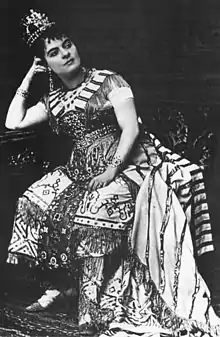Elena Sanz
Elena Armanda Nicolasa Sanz y Martínez de Arizala (1844–1898) was a Spanish opera singer from the 19th century and the mistress of Alfonso XII of Spain.
Elena Sanz | |
|---|---|
 | |
| Born | Elena Armanda Nicolasa Sanz y Martínez de Arizala 6 December 1844 Castellon de la Plana, Spain |
| Died | 24 December 1898 (aged 54) Paris, France |
| Partner | King Alfonso XII |
| Family | Son – Fernand Sanz |
Biography
Elena Sanz was born on 6 December 1844, in Castellón de la Plana (España). She was educated mainly at the Girls' School in Leganes along with her sister. At the age of ten, she entered the institution to learn singing, and joined a choir. She was a student of Baltasar Saldoni in the Madrid Royal Conservatory.
She met King Alfonso XII in Vienna in 1872.
In 1875, she had her first child from an unknown father.[1] Later during the years, she had two sons more with King Alfonso XII of Spain.[2] The King of Spain died at the age of 28 without recognizing his two sons – Alfonso and Fernando.[3]
In 1876, she was hired by the Paris Opera for two years, and she played her most important and influential roles there – Maddalena of Rigoletto and Brangäne in Tristan and Isolde. During the same years, she also made a premiere at the Teatro Real in Madrid.[4]
Appearance
Her contemporaries often considered her one of the best opera singers in Spain.[5] Elena travelled all across Europe to display her set of singing skills. She was most valued in the Paris Theater. Castelar described her as a red-lipped, brown-skinned, white-teeth, black hair woman, shining like a star.[6]
Literature appearances
Elena Sanz was often portrayed in fictional texts in Spain. In 2013, the writer Tomás Gismera Velasco featured Elena Sanz in his work "Elena Sanz: Tu serás mi reina".
She was also featured by Benito Pérez Galdós in his narratives concerning Sanz's relations with the monarch Alfonso XII.
References
- Zavala, José María (2011). Bastardos y Borbones : los hijos desconocidos de la dinastía. Plaza & Janés. ISBN 978-84-01-34767-2.
- "- EL MUNDO | Suplemento cronica 570 - "A LOS NENES, UN BESO DE TU ALFONSO"". www.elmundo.es. Retrieved 21 May 2021.
- Campo (2009)., Carlos Robles do. "«Los Infantes de España tras la derogación de la Ley Sálica (1830)». Anales de la Real Academia Matritense de Heráldica y Genealogía" (PDF). (12): 329–384. ISSN 1133-1240. Consultado el 19 de agosto de 2019. Archived (PDF) from the original on 19 August 2019.
- S.L, EDICIONES PLAZA. "Elena Sanz, la cantante de ópera que enamoró al rey". Cultur Plaza (in Spanish). Retrieved 21 May 2021.
- Urgoiti, Miren (2017). La favorita : la verdadera historia de Elena Sanz. M. Urgoiti. [Bilbao]. ISBN 978-84-697-6691-0.
{{cite book}}: CS1 maint: location missing publisher (link) - "Elena Sanz: Contralto espao la del siglo XIX". www.filomusica.com. Archived from the original on 5 January 2002. Retrieved 21 May 2021.